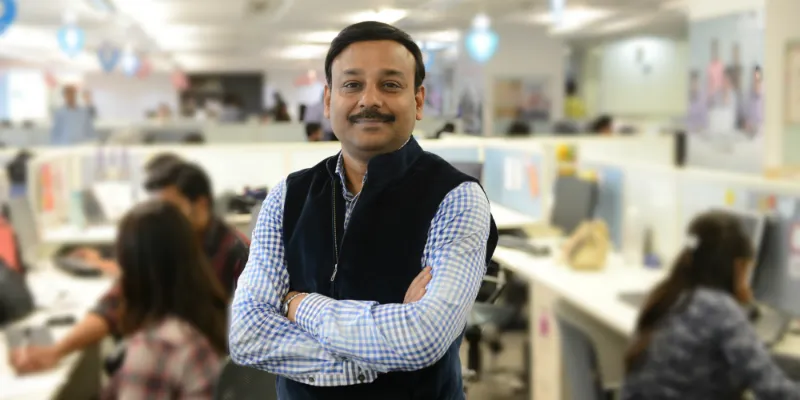5 guru mantras that helped me build Rs 500 Cr business
On the occasion of Teacher’s Day, IndiaMART Founder Dinesh Agarwal looks back on the lessons that have helped him reach where he is today.
Who is the best driving teacher? Your first bicycle. I believe in learning by experience. I have always learnt more from people and situations I have met and faced — family, friends, and colleagues. These people have not only inspired me but have always had my back through the potholes of life.

Dinesh Agarwal, Founder & CEO of IndiaMart InetrMesh.
Here are the five lessons that have helped me build the organisation of my dreams:
If you have the will, you will build your way: One epic that has really inspired me is the Ramayana. One of the most important things I have derived from it is the importance of value systems in our lives. It says, “Praan jaaye par vachan na jaaye.”
As entrepreneurs, we make a lot of commitments to our stakeholders. I strongly believe that it is our responsibility to try and fulfill them.
Another important lesson is that if you really believe in your cause and are ready to stand up for it, there is no way you can’t accomplish it.
Imagine what must have motivated two young boys to enter the kingdom of a demon like Ravana. It also makes me believe that passion is as important as talent. Imagine, an army of monkeys could win over Ravana’s well-trained soldiers.
When the dotcom bust and 9/11 happened, many thought IndiaMART wouldn’t be able to last, but our team was sure that this too shall pass and we worked together without worrying about the results. I feel proud when I say that we grew by 40 percent in that year.
Truth and simplicity put a lot of things straight: Gandhiji stood for satya (truth) and ahimsa (non-violence). I have realised that if you speak the truth, you will save a lot of your time. You won’t have to ever waste your time in thinking what to say.
Another very important lesson that we entrepreneurs can learn from Gandhiji is to have simple solutions to complex problems. He always came up with out-of-the-box solutions to larger issues. What is important here is that the common man could connect and contribute to his solutions, which is why they enjoyed mass appeal.
First do it yourself: I have been truly inspired by my grandfather. I come from an SME business family. There was nothing fancy about my childhood or education. My grandfather taught me how to hold my head high and not be hesitant. I grew up watching him and one thing I still remember is if there was ever a need he would not be embarrassed to behave like an 18-year-old, even at 80.
He was never afraid of opening up a Pandora’s box; he would happily volunteer to do it. Hence, I am never shy of picking up my phone and calling my client or admitting that I don’t know where a particular strategy would lead but that we should try.
Another very important lesson that he had given me was to first do it yourself. He would often try the Sunday recipes himself before asking my mother or grandmother, and I still do the same. If there is something that I can’t do, then I should not expect my team to know it.
There is never going to be a better time than now: Back in 2008-09, when my Co-founder Brijesh Agrawal and I were asked about our dream board member, we had very ambitiously said, "Nachiket Mor." I think it was one of the best things to happen to me. I have tried to inculcate some of Nachiket’s personality in myself.
One of the best things I have learnt from him is to be grounded. Nachiket had strictly told us to book him only economy flights. He would prohibit us from giving him any special treatment like booking a five-star hotel. It was at that point when most entrepreneurs would want to splurge on themselves. But after I met Nachiket, I realised that big cars and luxury villas don’t matter. What matters is what you do with them. I owe these values to him.
Another thing I have learnt from Nachiket is never to wait for the right time or opportunity but to create one because you will never have all the resources. He taught me to convert average into the best.
I still remember, after we had raised the first round of funding, we didn’t spend it at all. In fact, at one of the board meetings, I ended up flaunting Rs 100 crore in our company’s account. I had expected the board to appreciate it. Nachiket was the first one to get furious.
He said, “If this was the objective, why do you have us on board? Your growth rates are stagnant at 20 percent and you are flaunting Rs 100 crore in your bank account.”
The impact was so huge that in just 18 months we went from 400 clients a month to 4,000 clients every month. Nachiket wanted daily reports and I wanted them to look the best they could. Nachiket comes with a crystal-clear thought process and foresightedness, two qualities every leader must have. Sometimes, he could understand IndiaMART better than I could and that is what makes him so special for me.
What got you here won’t get you there: Dhruv’s contribution in my life has been really significant, so much so that I still call him masterji.
Until 2011–12, we had built IndiaMART as a stable and self-sufficient organisation. IndiaMART was largely a home-grown company. I would often feel the need to explore and experiment with how other organisations were working. I could foresee that IndiaMART's growth would stagnate if we did not diversify our team. I discussed this with one of our board members, Dhruv Prakash.
He gave me an assignment to read a book —What Got You Here Won't Get You There by Marshall Goldsmith.
Now, I can’t read huge books so he eased it out for me by just asking me to keep the book on my desk. Every day, I would read the title of the book and soon it was clear to me. We took up this project to expand and diversify our team, especially the leadership. Today, our team is a healthy mix of core team members and professionals who have worked in various organisations.
Today on Teachers’ Day, I would like to express my gratitude to these people who have helped shape my life.
I meet many people every day — customers, clients, colleagues, investors, family, and friends — all of whom have contributed to my growth. Today, I would like to thank each one of you for leaving a mark on my life. You might not have realised how your small and seemingly trivial guru mantras have made my life significant, but even today, when I face dilemmas, I go back to these philosophies and make my decisions.
Thank you, gurus, for your guru mantras.
(Disclaimer: The views and opinions expressed in this article are those of the author and do not necessarily reflect the views of YourStory.)









